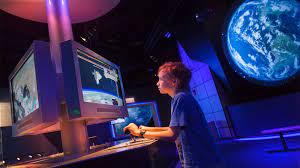The Importance of Space Exploration: Benefits and Challenges.
Space exploration has always been a source of wonder and inspiration for people around the world. From the first satellite launch in 1957 to the first human landing on the moon in 1969, space exploration has achieved many milestones that have expanded our understanding of the universe and opened up new avenues for scientific discovery. In this article, we will explore the importance of space exploration, its benefits, and the challenges associated with it.
Benefits of Space Exploration
Space exploration has numerous benefits that impact various fields, including science, technology, economics, and national security. Here are some of the most significant benefits of space exploration:
Scientific Discoveries: Space exploration has allowed us to study planets, stars, galaxies, and other celestial bodies, leading to many scientific discoveries. For example, space probes like Voyager have helped us to understand the structure of our solar system and the properties of planets like Jupiter and Saturn. The Hubble Space Telescope has helped us to study the evolution of galaxies and the origins of the universe itself.
Technological Advancements: Space exploration has spurred the development of new technologies that have improved our lives on Earth. For example, the space program led to the development of new materials, such as lightweight alloys and heat-resistant ceramics, which have found applications in industries such as aerospace, transportation, and medicine. Space exploration has also driven the development of communication and imaging technologies, including satellite television, GPS, and medical imaging.
Economic Benefits: The space industry generates significant economic benefits through job creation, investment, and the development of new technologies. According to a report by the Space Foundation, the global space economy was worth $447 billion in 2020, with more than 350,000 people employed in the industry in the US alone.
National Security: Space exploration is critical to national security, as it allows for the monitoring of potential threats, such as missile launches or hostile activities. Satellites also provide critical communications and intelligence capabilities for military and civilian purposes.
Challenges of Space Exploration
While space exploration offers many benefits, it also poses significant challenges that must be overcome. Here are some of the challenges associated with space exploration:
Cost: Space exploration is expensive, with missions often costing billions of dollars. This can be a barrier to entry for countries and organizations without significant resources.
Technological Complexity: Space exploration requires advanced technologies that must be reliable and capable of operating in harsh environments. Developing and testing these technologies can be time-consuming and expensive.
Risk: Space exploration carries inherent risks, including the risk of equipment failure, accidents, and human error. These risks must be carefully managed to ensure the safety of astronauts and other personnel involved in space missions.
Environmental Impact: Space exploration can have a negative impact on the environment, including the release of pollutants and the creation of space debris. These impacts must be carefully managed to minimize their effects on Earth and space.
Conclusion
Despite the challenges, space exploration remains an essential and exciting endeavor that offers numerous benefits. Through scientific discoveries, technological advancements, economic benefits, and national security, space exploration has the potential to transform our world and our understanding of the universe. As we continue to explore the final frontier, it is essential to carefully manage the challenges associated with space exploration to ensure its continued success and sustainability.





0 Comments:
Post a Comment
Subscribe to Post Comments [Atom]
<< Home